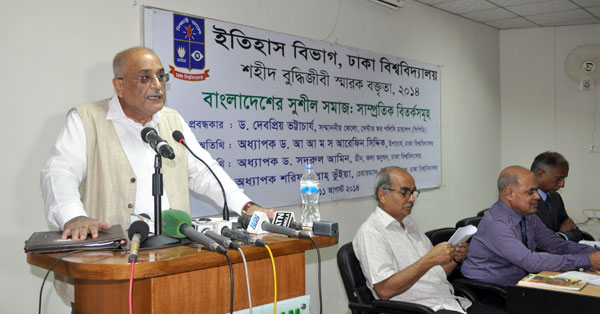A trust-building policy dialogue between the political society and the civil society under the purview of lenient and participatory nationalistic sentiments has now become urgent for enhancing both democracy and development in Bangladesh.
While delivering a public lecture on 11 August 2014, economist Dr Debapriya Bhattacharya observed that mutual trust between the political and the civil society has turned more fragile than any time before. The recently announced National Broadcast Policy has weakened it further, which he observed, was not supportive for national prosperity.
The CPD Distinguished Fellow was addressing the Martyred Intellectual Memorial Lecture on “Evolution of the Civil Society in Bangladesh and Some Debates”, organised by the Department of History, University of Dhaka, at the Serajul Islam Lecture Hall.
The civil society came across the pre and post-independence achievements in Bangladesh and often complementarily functioned within the political society. This mutual relationship gradually turned conflicting and even hateful on many occasions during the last two decades of Bangladesh’s new journey towards democracy. Taking this into account, Dr Bhattacharya called upon all concerned to show sincere and mature efforts in creating the space to resolve such conflict.
Dwelling on the definition and evolution of the civil society, Dr Bhattacharya noted that a generic definition could be drawn on the basis of socio-economic evolution, changing state structure and various international trends. But in most cases, the definition is an evolving, country-specific and context-specific concept.
Touching upon the Bangladesh context and recent trends, Dr Bhattacharya observed that a fair national consensus to define the civil society of the country was not yet in sight. In this context he pointed out three fundamental characteristics of civil society in Bangladesh, such as the civil society is an organisation beyond the state organs, it stays off political parties and carries out fair activities publicly in line with its programmes.
He asserted that there should be a difference between the civil society and the civil society organisations (CSOs), because the civil society may not always be structurally organised. In the backdrop of a divisive political culture, CSOs sometimes face difficulty in maintaining professional neutrality, he observed.
Regarding the debates over involvement of the civil society in politics, he said that political role of a socially conscious and active individual may not be unjustified. But it is unfair to use the civil society to strengthen one’s position in politics.
Sometimes allegations of indulgence in depoliticisation moves are also raised against the civil society. Dr Bhattacharya pointed out that the analysis of historic facts would reveal that such move was rather rooted in the political society, not within the civil society. He also noted that the validity and leadership of the civil society is determined by its moral strength. This is why the moral stance of members of the civil society or CSOs often comes under attack to weaken their reputation in public.
Professor Dr AAMS Arefin Siddique, Vice-Chancellor of the University, spoke as the Chief Guest while Professor Dr Sadrul Amin, Dean of the Arts Faculty, was present as the Special Guest with Professor Sharifullah Bhuiyan, Chairman of the Department of History, in the chair. A number of students and teachers from other than the History Department were present while some family members of the martyred intellectuals also attended the lecture.



